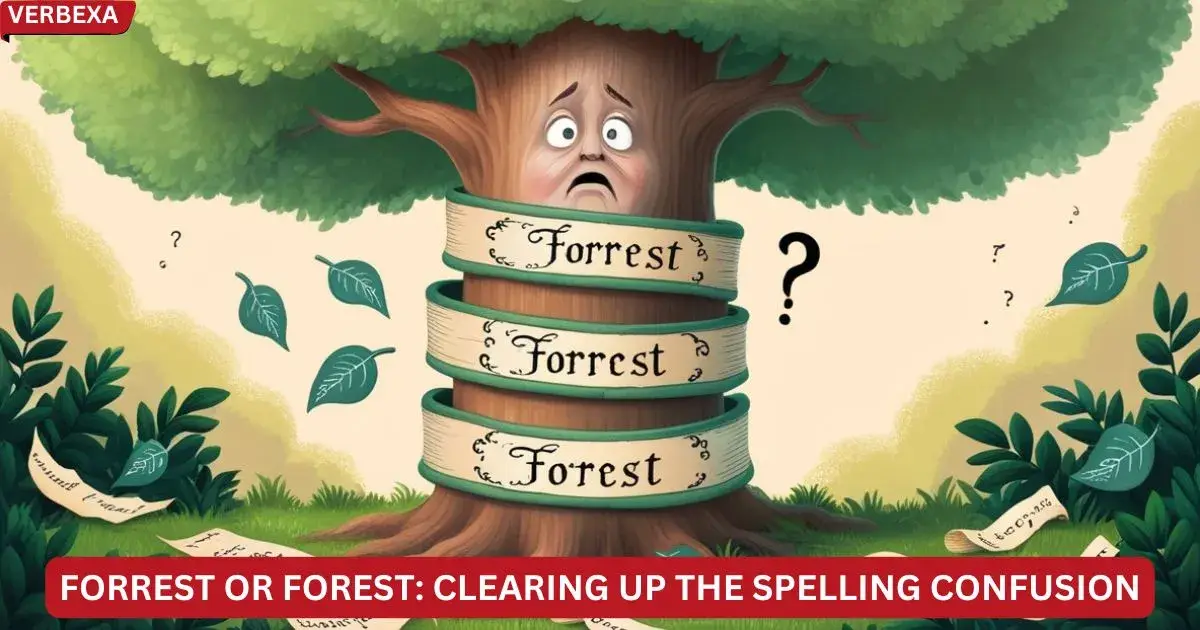The mix-up between “Forrest” and “Forest” is surprisingly common. Though these words may seem similar, they have different meanings. Forrest or Forest—Forest describes expansive, natural areas filled with trees, wildlife, and ecosystems, while Forrest is primarily a proper noun, often associated with individuals or fictional characters.
Getting the spelling right matters, whether you’re writing about nature or referencing a person. This article will clear up the confusion between these two terms, offering guidance on when to use each one correctly.
Why Are Forrest Or Forest Often Confused?
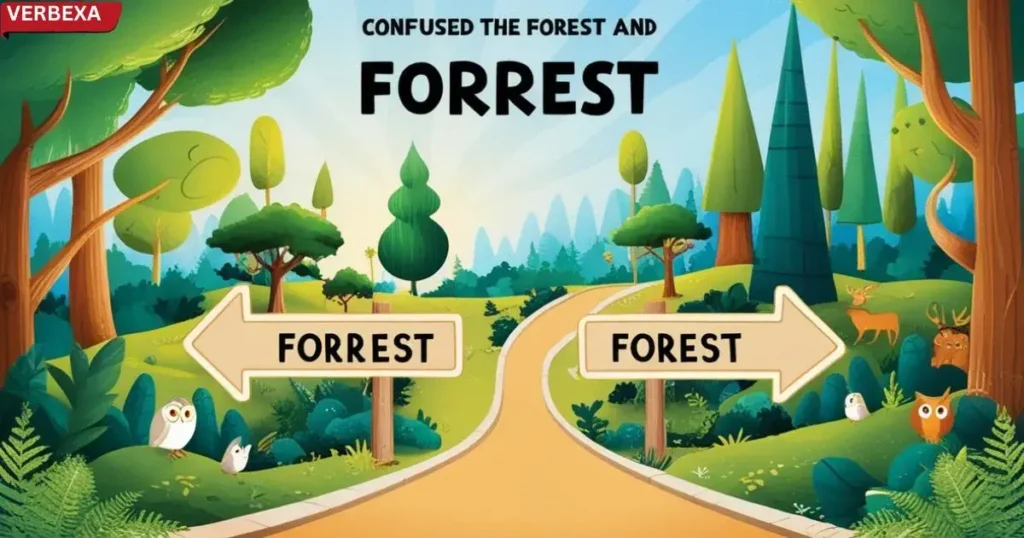
The confusion between Forrest and forest primarily arises from their similar sound and appearance, but they serve different roles in the language. In fact, this confusion is a common linguistic issue related to homophones, where two words sound the same but have different meanings and spellings. Understanding the semantic distinction between these words is crucial for proper communication.
Let’s explore the specific word meaning of each term, along with examples of when and how to use them in writing or speech. By doing so, you’ll gain a clear understanding of when to choose Forrest or forest, improving your syntax and overall writing accuracy.
Definitions and Usage
The confusion stems from the fact that these words are homophones – they sound alike but have entirely different meanings. Let’s break down each term:
Forrest (Proper Noun)
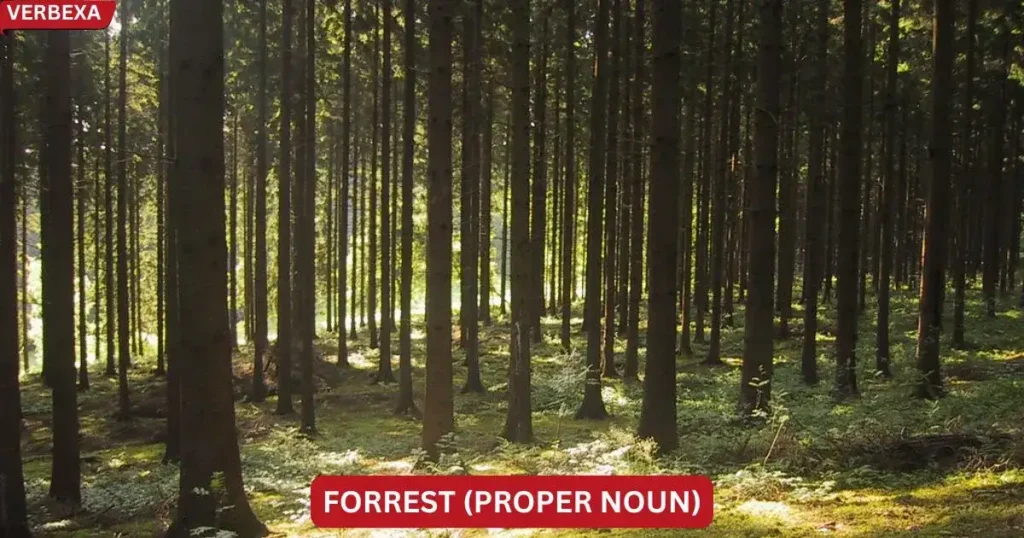
The term Forrest is a proper noun, which means it refers to a specific person, place, or thing. Most commonly, Forrest is used as a first name or last name. A famous example of this is Forrest Gump, the iconic character from the movie of the same name. As a proper noun, Forrest is capitalized and refers to an individual rather than an object or concept.
Example usage:
- “Forrest Gump is one of the most beloved movie characters of all time.”
- “My friend Forrest is coming to visit this weekend.”
Forest (Common Noun)
On the other hand, forest is a common noun, which refers to a general class of objects or concepts. Specifically, it denotes a large area of land covered chiefly with trees and other vegetation. Forests are essential to the environment, playing a key role in supporting wildlife, producing oxygen, and maintaining the ecological balance of the planet.
Example usage:
- “We went for a hike through the forest and saw many different species of animals.”
- “A forest provides habitats for countless creatures.”
Comparison Table: Forest vs Forrest
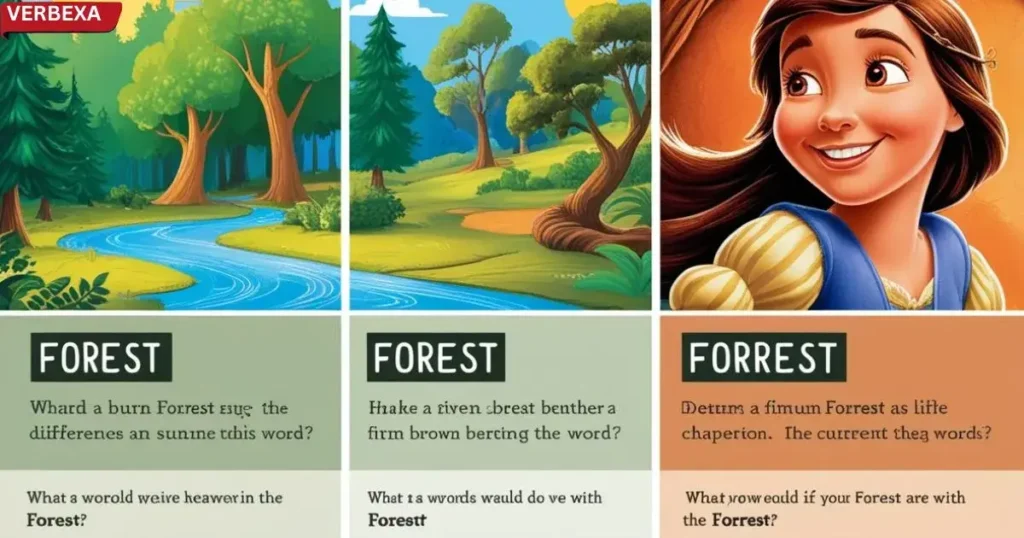
| Feature | Forrest | Forest |
|---|---|---|
| Part of Speech | Proper Noun | Common Noun |
| Definition | A given name (e.g., Forrest Gump) | A large area covered chiefly with trees |
| Capitalization | Always capitalized | Capitalized only at the beginning of a sentence or as part of a proper noun (e.g., Black Forest) |
| Usage | Refers to a specific person | Refers to a type of environment |
| Contextual Disambiguation | Easily identifiable as a name | Determined by the surrounding words |
When to Use Each Term
Knowing when to use Forrest or forest depends largely on the contextual disambiguation of your writing. Here are a few actionable tips to guide your choice:
Use Forrest when:
- Referring to a proper noun. For example, when talking about a person’s name, such as Forrest Gump.
- You are writing about someone who has the name Forrest. This is a personal reference, not a description of nature.
Use forest when:
- Referring to the natural environment that consists of trees, plants, and wildlife.
- You are discussing ecological concerns like deforestation or conservation.
- The word is being used in a general sense to talk about wooded areas or nature.
Everyday Usage Examples
Let’s solidify understanding with some relatable examples:
- Forrest: “Forrest Gump inspired many with his unwavering optimism.” Here, Forrest is a proper noun, referring to the specific person. Forrest or Forest – proper noun usage.
- Forrest: “My friend Forrest is an avid hiker.” Again, Forrest is the name of a person. Forrest or Forest – proper noun usage.
- Forest: “We took a walk through the dense forest.” Here, forest is a common noun, describing a type of landscape.
- Forest: “The animals sought shelter in the forest from the storm.” Here, the forest provides a habitat. This exemplifies a semantic entity representing a natural environment.
- Forest: “The government is working to protect the forest from deforestation.” This sentence highlights the environmental concern of protecting the forest.
- Forest: “The forest floor was covered in a thick layer of leaves.” This sentence places the forest within the natural environment. The word meaning is clear in its context. The syntax is straightforward and correct.
These examples show the distinct usages of Forrest and forest, illustrating the clear semantic distinction between them.
Origins of “Forrest” vs. “Forest”: Understanding the Roots
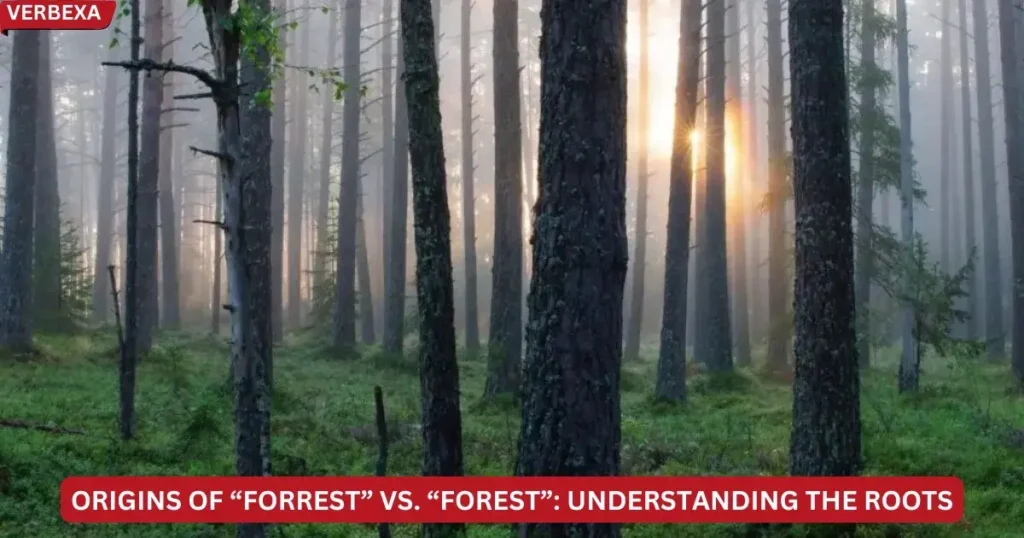
The words “Forrest” and “Forest” may appear similar, but their origins diverge significantly. Forest traces its roots to the Latin word forestis, meaning “outside” or “the woods.” Over centuries, it evolved to refer to a large area covered chiefly with trees, serving as a habitat for countless species. The word became entrenched in the English language, widely used to describe natural landscapes.
On the other hand, Forrest has a different origin. It is believed to have come from an Old French name Forêt, which originally denoted a person who lived near or worked in the woods. Thus, while both terms have connections to nature, they come from different linguistic and cultural sources.
Understanding the historical distinctions between these words helps clarify their usage today. The use of Forest remains mostly geographical, describing vast natural areas.
However, Forrest has become widely recognized as a personal name, especially after it gained prominence through characters in popular culture, such as Forrest Gump. Both terms have deep roots in language, but their applications vary based on context, making it crucial to use them accurately.
A Brief History: The Tale of Two Spellings
The tale of “Forrest” and “Forest” showcases how subtle differences in spelling can lead to significant variations in meaning. Forest evolved from the Latin word forestis, while Forrest likely originated as a surname derived from early French or Anglo-Saxon terms.
Over time, Forest became synonymous with woodlands and natural landscapes, while Forrest emerged as a given name. This difference highlights how language adapts and shifts in response to both nature and culture. The use of these terms today is shaped by centuries of linguistic history and cultural evolution.
“Forest”: Much More Than Just Trees
The word Forest represents much more than just trees; it symbolizes the richness of nature and the ecosystem that thrives within it. It evokes feelings of adventure, mystery, and connection to the earth. The forest is often seen as a place of sanctuary and exploration, where wildlife, plants, and natural beauty come together.
Its importance goes beyond its physical appearance, offering a vital role in the environment, sustaining life, and providing balance to the planet. The forest is a symbol of the natural world’s complexity and interconnectedness.
“Forrest”: A Name That Holds Meaning Beyond Nature
In contrast, Forrest has evolved into a personal name, often carrying emotional and cultural significance beyond nature. It’s a name linked with historical figures and fictional characters, such as Forrest Gump, that have left lasting impressions in popular culture.
As a name, Forrest signifies qualities like strength, resilience, and individuality, making it distinct from its natural counterpart. Whether referring to a person or a place, Forrest holds a unique place in the hearts and minds of many, resonating with meanings that go beyond the natural world.
The Semantic Distinction: Forrest vs Forest
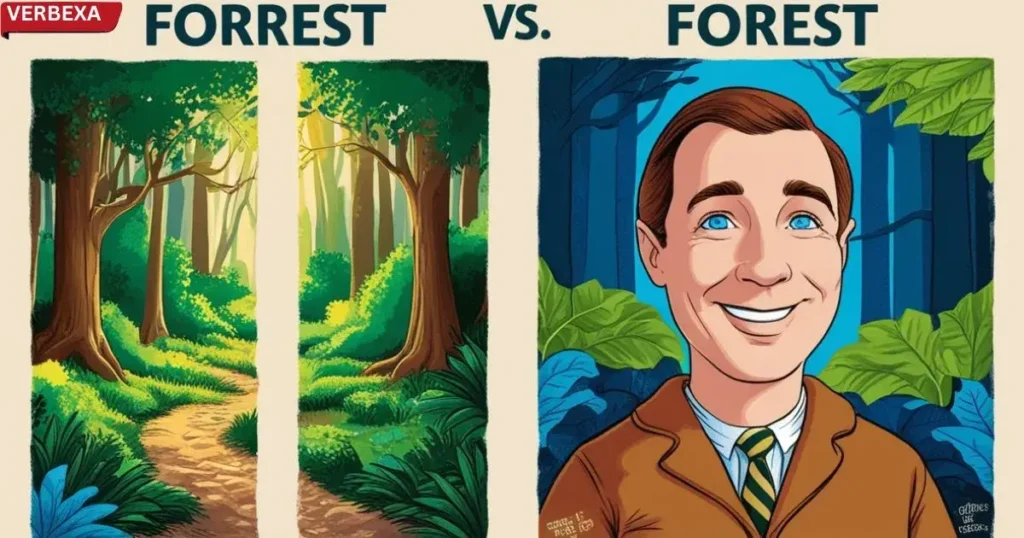
At first glance, Forrest and forest may seem almost identical, but the semantic distinction between the two is clear once you understand their different roles in language.
- Forrest as a proper noun is used to name a person, usually a first or last name. It could also appear in literature or media as a character’s name, such as Forrest Gump.
- Forest, on the other hand, as a common noun, refers to a physical place or environment. It’s not a name but a description of nature, trees, and wildlife.
Forrest or Forest Pronunciation
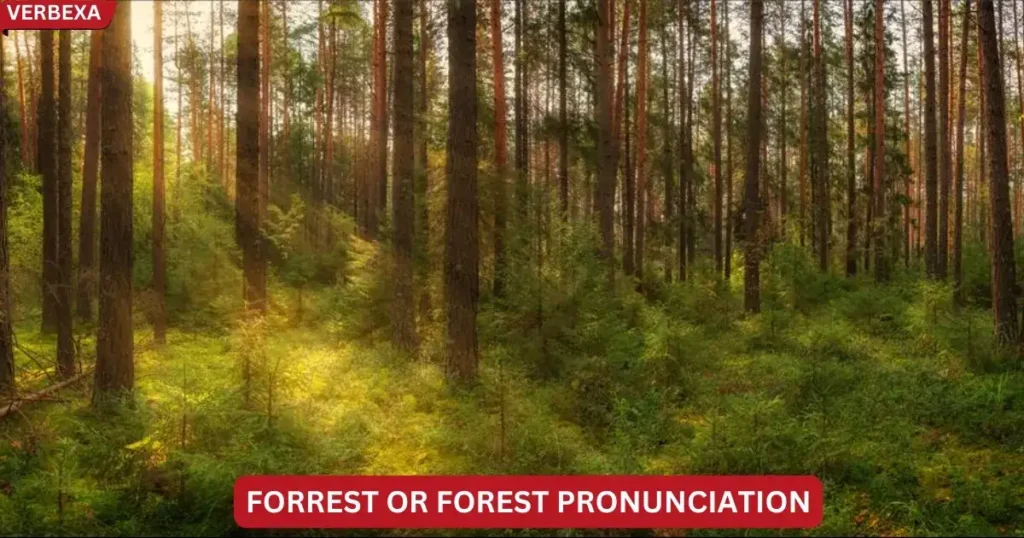
- Forest is pronounced as “for-ist,” with emphasis on the first syllable.
- Forrest is pronounced as “for-rest,” with a clearer second syllable.
- Both words share the same starting sound but differ in the second syllable.
- Forest follows a natural rhythm, commonly used for woodlands or large green areas.
- Forrest is typically a name and often has a more distinct second syllable.
- Pronouncing these words correctly is key to avoiding confusion in speech.
Common Mistakes: Incorrect Usage of Forrest Or Forest
Now that we’ve covered the correct contexts for both terms, let’s address a few common mistakes that might occur due to the spelling confusion between Forrest and forest.
- Mistaking Forrest for forest: Some writers may mistakenly use Forrest when they are referring to a natural wooded area. This is incorrect because Forrest is a name, not a description of land or trees.
- Incorrect: “We went on a hike through the Forrest.”
- Correct: “We went on a hike through the forest.”
- Mistaking forest for Forrest: On the flip side, referring to someone named Forrest as forest would also be incorrect, as it undermines the fact that Forrest is a proper noun.
- Incorrect: “I met a guy named forest at the party.”
- Correct: “I met a guy named Forrest at the party.”
By staying mindful of these distinctions, you can avoid common pitfalls in writing.
Frequently asked Questions
Which is correct, forest or forrest?
“Forest” is the standard spelling for a wooded area; “Forrest” is a proper noun, a name.
How do Americans spell forest?
Americans, like the British, typically spell it “forest.”
How do you spell forest in the UK?
The UK spelling for a wooded area is “forest.”
How do you pronounce Forest?
Forest is pronounced as “for-ist,” with the emphasis on the first syllable (“for”). The second syllable is softer and quicker, sounding like “ist.”
How to spell forest?
Forest is spelled F-O-R-E-S-T. It refers to a large area covered primarily with trees and vegetation.
How do you spell forest with trees?
You spell it “forest,” regardless of the number of trees.
What do you call a forest of trees?
A large area with many trees is simply called a “forest.”
Is it forest or forrest?
“Forest” is the correct spelling for a wooded area; “Forrest” is a proper name.
Conclusion
The confusion between Forrest Or Forest is a classic example of spelling confusion due to similar-looking words with distinct meanings and roles in language. By understanding the difference between the proper noun (Forrest) and the common noun (forest), you can easily avoid common mistakes in writing and speaking.
To summarize:
- Use Forrest when referring to a person’s name (e.g., Forrest Gump).
- Use forest when talking about a natural area of trees, wildlife, and vegetation.
When in doubt, remember that Forrest is a proper noun, while forest refers to nature. This clarity will help you make the right choice in your writing and ensure correct usage in both professional and everyday contexts. So, next time you’re faced with the question of forest vs forrest, you’ll know exactly which term to choose!

This author is a passionate linguist and grammar enthusiast, dedicated to helping individuals master the art of language. With years of experience in teaching and editing, she brings clarity and precision to every sentence. Tina’s mission is to empower writers of all levels to express themselves with confidence and excellence.

